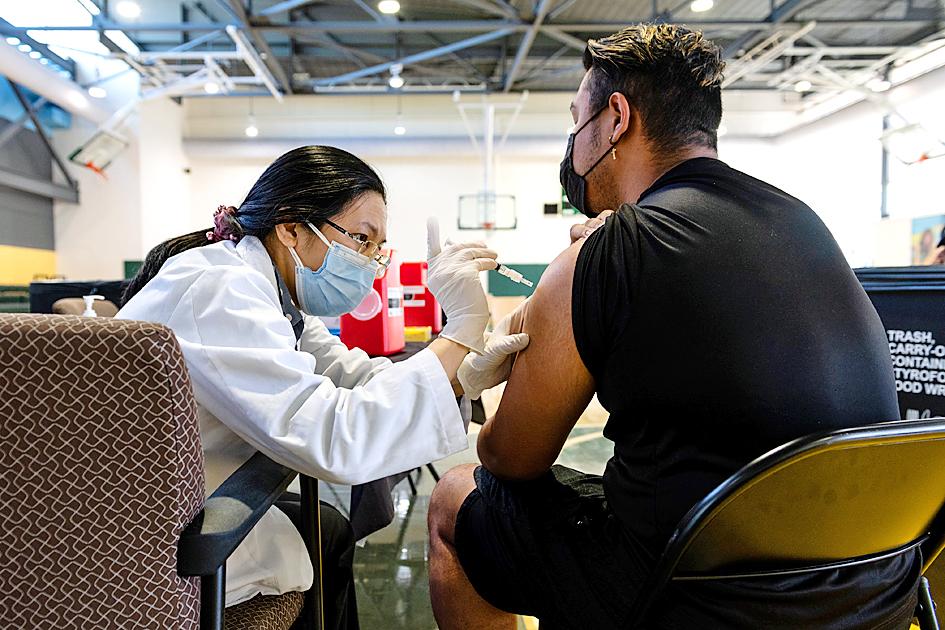US President Joe Biden wants 70 percent of US adults to have received at least one shot of a COVID-19 vaccine by the July 4 holiday, and has made vaccinating adolescents a key part of the next phase of the country’s immunization campaign.
However, targeting US teens is a controversial move among many experts, who say that it is a serious mistake to use the world’s limited supply of doses on a low-risk population while the COVID-19 pandemic surges in countries such as India and Brazil.
Pfizer and its partner BioNTech in March said that their two-dose regimen was shown to be safe and highly effective in a trial of 2,260 12-to-15-year-olds.

Photo: Bloomberg
An emergency use authorization is expected in the coming days, and Biden on Tuesday told White House reporters that “if that announcement comes, we are ready to move immediately.”
The president’s address comes as the nation’s immunization campaign is stalling after hitting a peak early last month.
More than 56 percent of US adults have received one or more shots, but as the rate of uptake falls, officials are devising new ways to reach vaccine holdouts.
These include discounts to shoppers who get vaccinated at grocery stores, promotions for fans at sports stadiums and more vaccines at rural health clinics, Biden said.
The federal government is also working on a program with pharmacies and pediatricians nationwide to reach the country’s estimated 17 million 12-to-15-year-olds ahead of school reopening in the fall.
However, many experts have voiced concern whether now is the right moment to reach this group as the global situation deteriorates.
The issue of vaccine disparity has been brought into sharp focus by India, which on Tuesday reported more than 350,000 new cases and recorded nearly 3,500 deaths — more than anywhere in the world.
“The overwhelming majority of 15-year-olds, we know are not at high risk of severe complications from COVID,” said Craig Spencer, an emergency room doctor and director of Global Health in Emergency Medicine at Columbia University.
“It is absolutely raging around the world and we’re talking about how we’re going to vaccinate an incredibly low-risk population, when the overwhelming majority of healthcare workers around the world have zero protection,” he said.
Priya Sampathkumar, chair of Infection Prevention and Control at Mayo Clinic in Minnesota, added that beyond being an ethics issue, exporting more vaccines is in the US’ own best interest.
“Vaccinating more people in the US is not going to help us if the variants in India, Nepal and South Asia get out of control and hit our shores,” she said.

CHIPMAKING INVESTMENT: J.W. Kuo told legislators that Department of Investment Review approval would be needed were Washington to seek a TSMC board seat Minister of Economic Affairs J.W. Kuo (郭智輝) yesterday said he received information about a possible US government investment in Taiwan Semiconductor Manufacturing Co (TSMC, 台積電) and an assessment of the possible effect on the firm requires further discussion. If the US were to invest in TSMC, the plan would need to be reviewed by the Department of Investment Review, Kuo told reporters ahead of a hearing of the legislature’s Economics Committee. Kuo’s remarks came after US Secretary of Commerce Howard Lutnick on Tuesday said that the US government is looking into the federal government taking equity stakes in computer chip manufacturers that

NORTHERN STRIKE: Taiwanese military personnel have been training ‘in strategic and tactical battle operations’ in Michigan, a former US diplomat said More than 500 Taiwanese troops participated in this year’s Northern Strike military exercise held at Lake Michigan by the US, a Pentagon-run news outlet reported yesterday. The Michigan National Guard-sponsored drill involved 7,500 military personnel from 36 nations and territories around the world, the Stars and Stripes said. This year’s edition of Northern Strike, which concluded on Sunday, simulated a war in the Indo-Pacific region in a departure from its traditional European focus, it said. The change indicated a greater shift in the US armed forces’ attention to a potential conflict in Asia, it added. Citing a briefing by a Michigan National Guard senior

POWER PLANT POLL: The TPP said the number of ‘yes’ votes showed that the energy policy should be corrected, and the KMT said the result was a win for the people’s voice The government does not rule out advanced nuclear energy generation if it meets the government’s three prerequisites, President William Lai (賴清德) said last night after the number of votes in favor of restarting a nuclear power plant outnumbered the “no” votes in a referendum yesterday. The referendum failed to pass, despite getting more “yes” votes, as the Referendum Act (公民投票法) states that the vote would only pass if the votes in favor account for more than one-fourth of the total number of eligible voters and outnumber the opposing votes. Yesterday’s referendum question was: “Do you agree that the Ma-anshan Nuclear Power Plant

ENHANCED SECURITY: A Japanese report said that the MOU is about the sharing of information on foreign nationals entering Japan from Taiwan in the event of an emergency The Ministry of Foreign Affairs yesterday confirmed that Taiwan and Japan had signed an agreement to promote information exchanges and cooperation on border management, although it did not disclose more details on the pact. Ministry spokesman Hsiao Kuang-wei (蕭光偉) said the ministry is happy to see that the two nations continue to enhance cooperation on immigration control, in particular because Taiwan and Japan “share a deep friendship and frequent people-to-people exchanges.” “Last year, more than 7.32 million visits were made between the two countries, making it even more crucial for both sides to work closer on immigration and border control,” he said. Hsiao